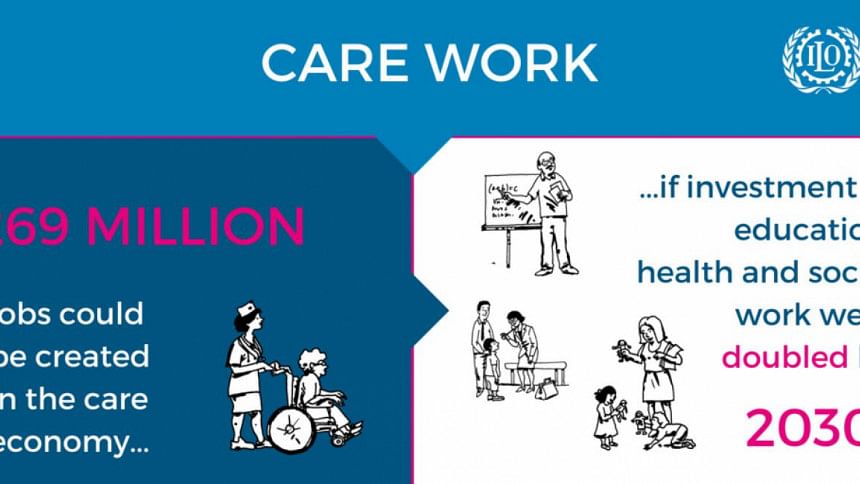Ageing global societies: an opportunity for Bangladesh

Global demographic trends today confirm increasing longevity of populations which is accompanied by a reduction in fertility rates. The Asian continent is currently the home of 440 crore people representing more than half of the total global population which in 2019 reached 770 crore according to www.worldometers.info/world-population/.
Countries such as China, Japan, South Korea and Thailand are well-known to be rapidly ageing societies. On the contrary, countries like Bangladesh, Laos, India and Vietnam currently enjoy a demographic profile that comprises young populations (in each case, the youth vastly outnumber the old). This difference in the demographic structure of societies opens up possibilities for predominantly "young" countries like Bangladesh to prepare themselves to supply the labour force for employment opportunities in "ageing" societies. Due to the constantly increasing number of old people, there is and will continuously be an increasing demand for care workers. Simultaneously, there will be the need of developing capacities for growing the care sector.
In addition, growing female labour force participation rates correspond with the traditional engagement of women with care responsibilities at home and in care sector paid jobs. However, the stereotypes that care jobs are only "female professions", as well as the insufficient prestige attached to care jobs must be challenged and changed. The increasing importance and value-addition these jobs bring to the societies need to be highlighted. It is evident that more economically advanced countries attach higher value to care sector jobs, invest in very intensive training of care workers, and create better-paid care jobs than is the case in less developed countries. It is indispensable to emphasise and advocate the importance of care jobs and to fight "cultural" models that do not value these jobs.
In 2018, the ILO published a report titled "Care work and care jobs for the future of decent work", which defines paid care work as work performed for pay or profit by care workers. Workers in the care economy comprise of a wide range of personal service workers, such as nurses, teachers, doctors and personal care workers. Domestic workers, who provide both direct and indirect care (e.g. cooking and cleaning) in households, are also part of the care workforce.
According to the national statistical data during 2017, Bangladesh's overseas employment consisted of more than one million migrant workers, many of whom are women. A large number of them end up working as domestic workers providing both direct and indirect care in households in the destination countries. Most of them are unskilled and consecutively have low-paid jobs. In order to correct this disadvantageous situation, Bangladesh is already directing investments to upgrade their skills and improve their opportunities to compete for better-paid jobs. More specifically, the Bangladesh Technical Education Board (BTEB) already has established competency standards for the caregiver occupation. Simultaneously, the Bangladesh-Korea Technical Training Centre already conducts training programmes to prepare job seekers wishing to migrate as caregivers.
In January 2019, a workshop was organised by ILO Bangladesh and International Training Centre (ITC) (the Turin, Italy based training arm of ILO) in Dhaka, which focussed on opportunities that the care economy offers. It had participants ranging from researchers, the private sector and policymakers from the Asean countries, Bangladesh, China, Qatar, India and Vietnam.
From the discussions and deliberations, it clearly emerged that caregiving jobs were not to replace medical nurses or nannies. The occupation of caregiving was more about adding few additional dimensions to the profile of a domestic worker by providing skills that would enable the person to take on functions which would support ambulant care for those who need it in the household, e.g. senior citizens and persons with disabilities.
The key discussions at the workshop focussed on the need for caregivers to be skilled not only in practical aspects of caregiving but on cultural aspects of the host families. Given the intimate nature of care services that are often involved, possessing soft skills (e.g. how not to speak loudly which may startle a senior citizen or how to be a good active listener and possess language skills that allow easy communication with the host) is as important as possessing hard skills (e.g. transferring a senior citizen efficiently, safely and in a dignified manner from the bed to a wheelchair).
The EU-funded Skills 21 project implemented by ILO in Bangladesh has included caregiving as one of the occupations in which short-term courses will be offered through some of the seven model institutions that the project works with. It aims to support the Government of Bangladesh to improve the skills of the young population and support their integration into the labour market. The additional positive effect will be by helping them to find jobs in the care economy to help them up-grade their skills to be able to move to higher skill and competency levels.
Snehal Soneji is Chief Technical Advisor, Skills 21 Project, and Yordanka Tzvetkova is Manager, Brics Programme, International Training Centre, ILO.

 For all latest news, follow The Daily Star's Google News channel.
For all latest news, follow The Daily Star's Google News channel. 



Comments